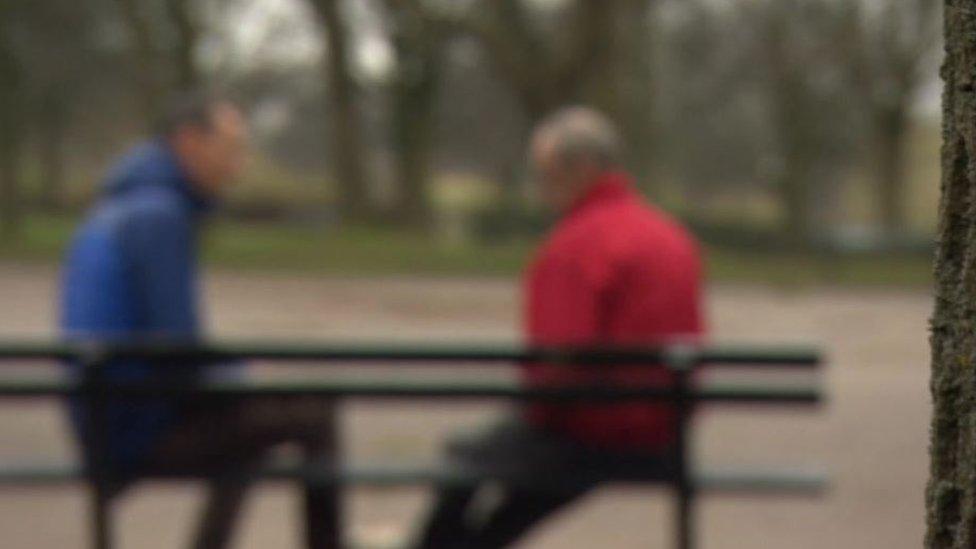Rooney family slavery victim 'made to dig own grave'
- Published
The sister of one of the victims says he was forced to dig his own grave
Members of a traveller family have been jailed for enslaving 18 men who were made to work for little or no wages while their captors lived a life of lavish luxury.
The workers were illegally trafficked and exploited by the Rooney family - 10 men and one woman - whose actions left a gruelling mark on their victims.
One man's terrifying ordeal spanned more than a quarter of a century. On one occasion, he was made to dig his own grave if he did not agree to a lifetime of servitude.
"You're going to work for me for the rest of your life... if you don't sign this contract that is where you're going," John Rooney told his victim, pointing at the hole he had been forced to dig.
The harrowing details have been told to the BBC by the victim's sister.
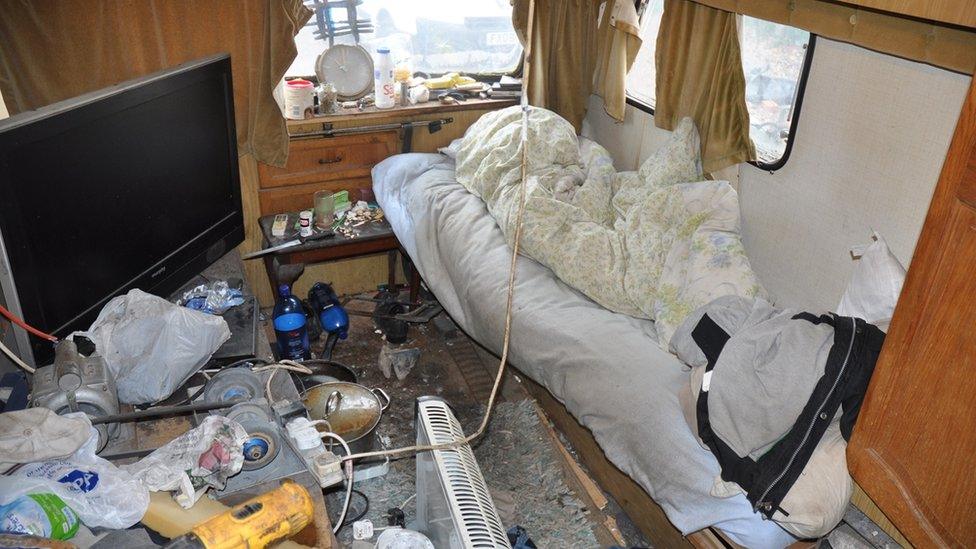
Police said the living quarters of 18 men who were trafficked into a modern slavery ring were "truly shocking"
She described how her brother was beaten with a rake and had his front teeth smashed with a concrete slab in savage attacks which left him "psychologically damaged".
"I think one of the worst stories he told me was about digging his own grave," his sister, who cannot be named for legal reasons, told the BBC.
"John Rooney had asked him to dig a hole and he said, 'I kept digging and digging and digging. I said to John: Crikey how much more have I got to dig? And he said keep digging'.
"According to my brother, John produced a contract and said to him 'you're going to work for me for the rest of your life... if you don't sign this contract that is where you're going'.
"On another occasion, he was late getting up and John came into his van with a rake and hit him over the head. You can see evidence of scarring on the left side of his head.
"It's harrowing."
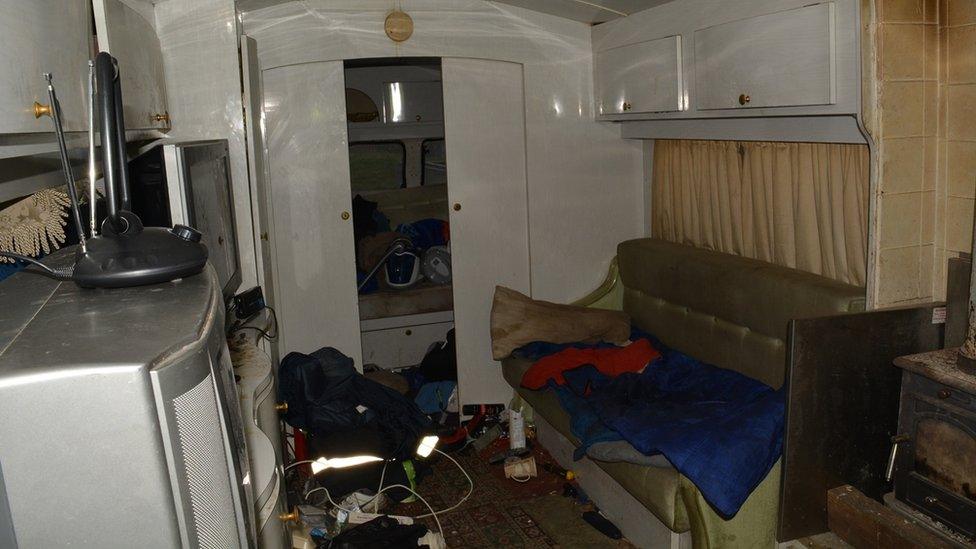
Animal faeces were found inside the workers' squalid accommodation
The victims were aged between 18 and 63, held in squalor and forced to work up to 12-hour days, seven days a week, for the family's tarmacking company.
While the Rooneys led an extravagant lifestyle, their slaves lived in filth - some in stables next to dog kennels, many in unkempt caravans without running water or toilet facilities.
"Many were very, very thin and they were absolutely filthy," said Ch Supt Nikki Mayo, of Lincolnshire Police.
"These individuals didn't have a toilet so many had to go into the woods and, in fact, some were kept in a stable block nearby with animals. So, absolutely disgraceful."
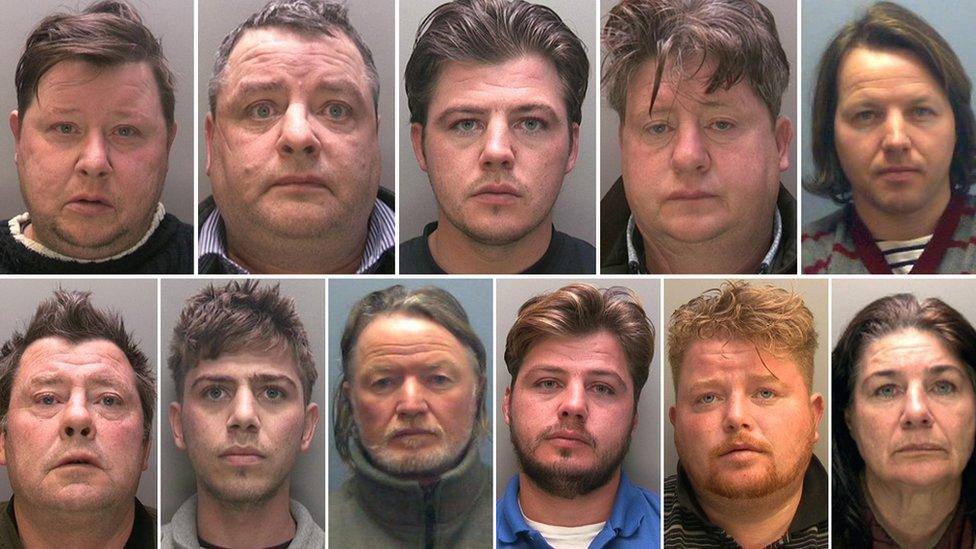
The 11 members of the Rooney led extravagant lifestyles while their victims suffered
Many were alcoholics and estranged from their relatives, while several had learning disabilities and mental health issues. Half were British nationals targeted from all over the country because they were homeless.
Ch Supt Mayo said the victims were left "completely institutionalised and isolated from society".
"They were given scraps of food that were mainly leftovers from family meals, complete with bite marks, but only after working long hard hours tarmacking driveways and fitting block paving," she said.
"When they weren't working for the company the men had to collect scrap, sweep, tidy up or look after pets around the sites.
"Often their only payment was a packet of tobacco and a limited amount of alcohol, which didn't help those with addictions and was another way in which the defendants exerted control over them."

The men worked long hard hours for little more than a packet of tobacco
Even though the victims were "not physically trapped", they were "financially, emotionally and physically abused making any escape seem impossible", the detective added.
The threat of violence also made them too scared to leave. One victim told police he was afraid of the Rooney gang because he had seen the brutality they had inflicted on others.
"There was one moment one of the [Rooneys] took a shovel... and then I [saw] three people kicking [the slave] as he was lying on the ground," he said.
"I've been quite scared because I've seen what they're capable of."
The family operated from a number of sites in Lincolnshire and were caught as part of Operation Pottery, which detectives described as "one of the largest and most complex" cases in the force's history.
Reverend Jeremy Cullimore, who worked in a homeless shelter in Lincoln, said he had tried to protect potential victims.
"We were aware that the Rooneys [had] a series of vans driving around the streets, seeking out people, to persuade them that they could offer them a nice caravan and so on.
"We introduced a number of systems so that people who were vulnerable would not be alone."

The defendants led a lavish lifestyle and operated from a number of sites
He recalled the moment he came head-to-head with the gang.
"The family [came] to recover a man who escaped from them and they were saying quite clearly 'he's ours, he owes us money and we want him'.
"I turned around and said 'You know I'm a priest and I can absolve you from your sins, but beware I can bind them to you forever. Now think on this' and they left.
"It was a challenge."
When police officers dismantled the ring in 2014, the force set up a refuge for the victims aided by the NHS, social services, British Red Cross and the UK Human Trafficking Centre.
One charity worker, who wanted to remain anonymous, said one individual used "an entire bottle of shampoo to make themselves feel clean".
"When I first saw them they looked completely bedraggled. One of them asked how long he could shower for. We said 'as long as you like' and he was completely taken aback by the response.
"After 20 minutes he came out looking like a different person. The colour in his skin came back. He just felt like a normal human being."
But how did the Rooney slavery ring operate undetected for so long?
Kevin Hyland, the UK's Independent Anti-Slavery Commissioner, said there was a lack of awareness about slavery legislation and recognising the signs.
"People in the communities haven't recognised this for what it is or haven't really understood what it is," he said. "But this case really does demonstrate how serious this crime is and it can be happening on your own front drive.
"There has been a lack of understanding and awareness but, then also, what do you do when you recognise it? The authorities themselves need to understand this and realise this is a crime and they have a duty to respond."
Under the Modern Slavery Act, introduced in 2015, it is illegal to hold someone in slavery or servitude and force them to carry out compulsory labour.
For the woman whose brother was captive for 26 years, the mark left by his experience is indelible.
On seeing him for the first time after his release, she said she wanted to "fall on my knees and sob".
"He was very thin. His teeth are terrible, they're all rotten and he's not got many left.
"He's damaged... but he's now enjoying his freedom."
- Published11 August 2017

- Published10 August 2017
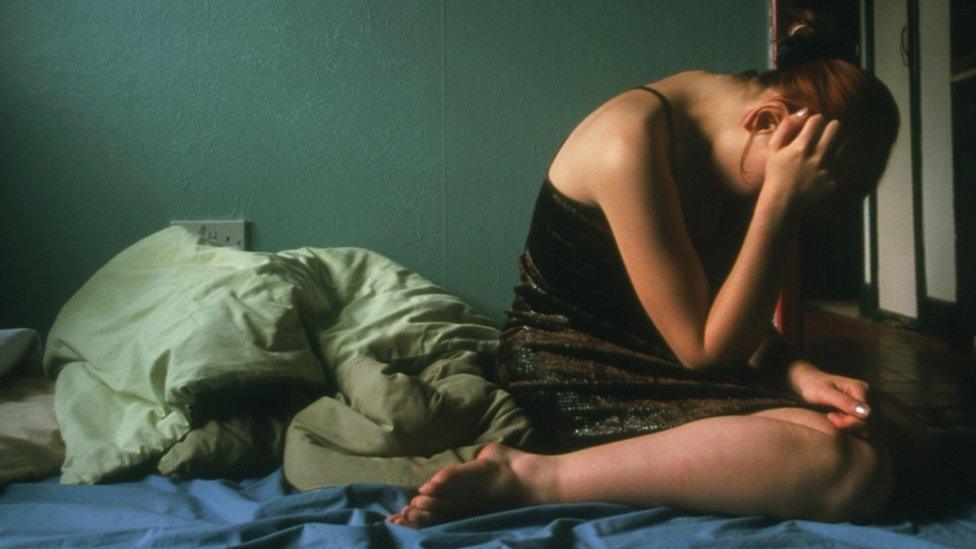
- Published4 April 2017
